Utility and Plausibility of Ethical Models in Business: Morrisons Case
VerifiedAdded on 2024/05/14
|6
|1372
|146
Essay
AI Summary
This essay delves into the utility and plausibility of ethical models in achieving business success, focusing on a case study of Morrisons Supermarket. It examines utilitarianism and deontological theory, highlighting their strengths and weaknesses in practical business applications. Utilitarianism is presented as a method for moral reasoning, balancing ethical costs and benefits, while deontology aligns with intuitive judgments of right and wrong, emphasizing stakeholder management. The analysis considers the challenges of both theories, such as the unpredictability of consequences in utilitarianism and conflicting moral objectives in deontology. The essay concludes by emphasizing the importance of ethical values within the workplace to foster proper employee behavior, providing a comprehensive overview of ethical considerations for modern businesses.
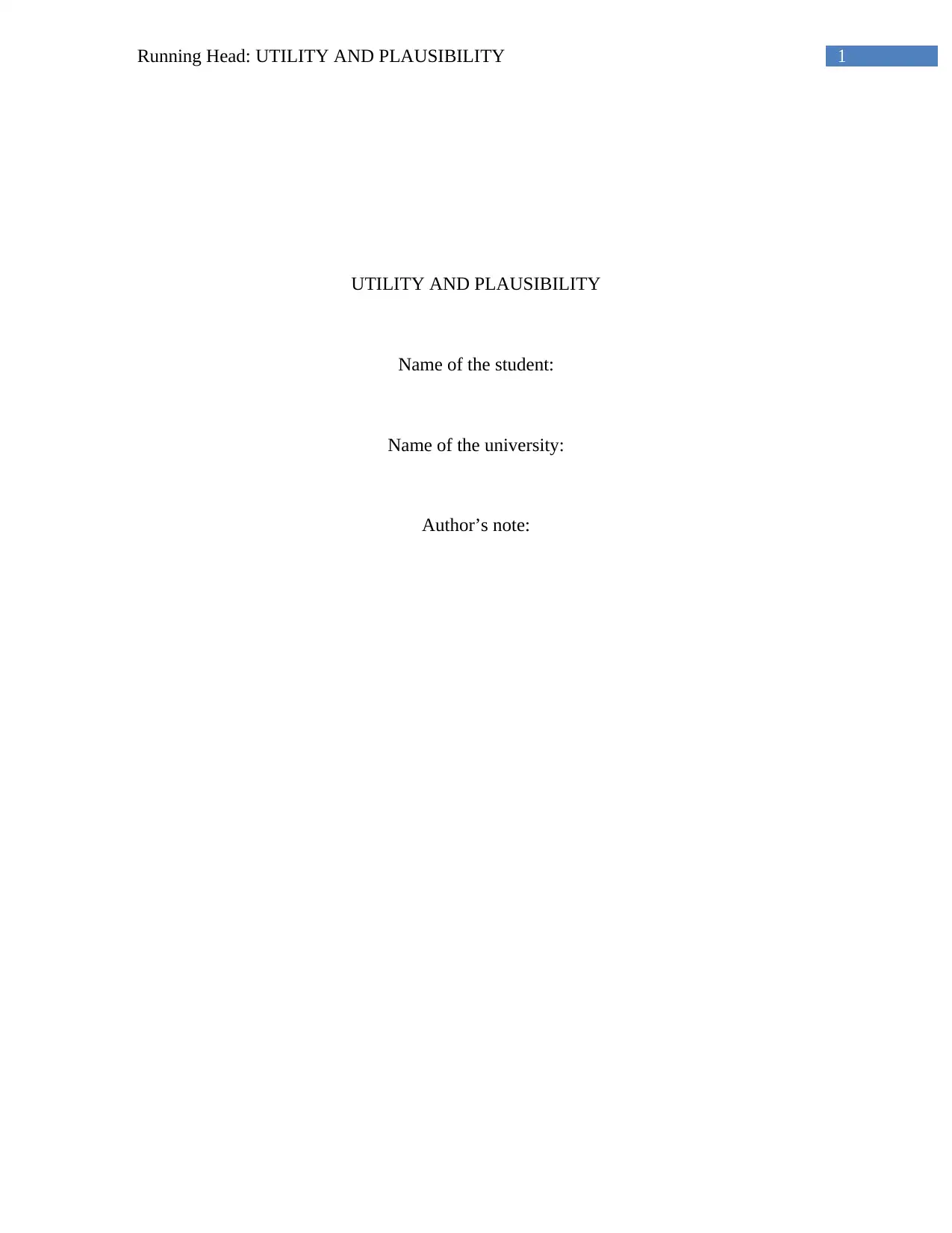
1Running Head: UTILITY AND PLAUSIBILITY
UTILITY AND PLAUSIBILITY
Name of the student:
Name of the university:
Author’s note:
UTILITY AND PLAUSIBILITY
Name of the student:
Name of the university:
Author’s note:
Paraphrase This Document
Need a fresh take? Get an instant paraphrase of this document with our AI Paraphraser
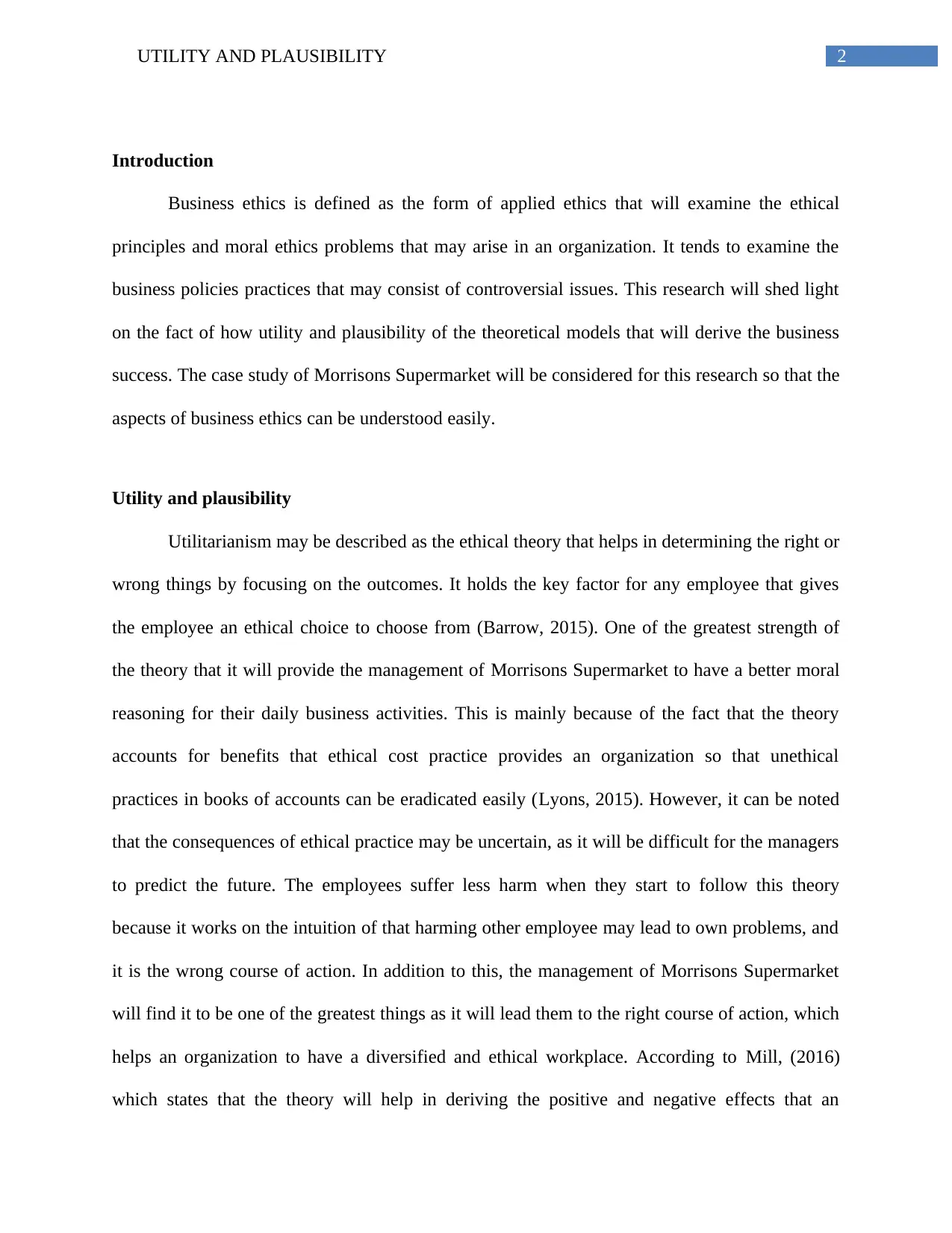
2UTILITY AND PLAUSIBILITY
Introduction
Business ethics is defined as the form of applied ethics that will examine the ethical
principles and moral ethics problems that may arise in an organization. It tends to examine the
business policies practices that may consist of controversial issues. This research will shed light
on the fact of how utility and plausibility of the theoretical models that will derive the business
success. The case study of Morrisons Supermarket will be considered for this research so that the
aspects of business ethics can be understood easily.
Utility and plausibility
Utilitarianism may be described as the ethical theory that helps in determining the right or
wrong things by focusing on the outcomes. It holds the key factor for any employee that gives
the employee an ethical choice to choose from (Barrow, 2015). One of the greatest strength of
the theory that it will provide the management of Morrisons Supermarket to have a better moral
reasoning for their daily business activities. This is mainly because of the fact that the theory
accounts for benefits that ethical cost practice provides an organization so that unethical
practices in books of accounts can be eradicated easily (Lyons, 2015). However, it can be noted
that the consequences of ethical practice may be uncertain, as it will be difficult for the managers
to predict the future. The employees suffer less harm when they start to follow this theory
because it works on the intuition of that harming other employee may lead to own problems, and
it is the wrong course of action. In addition to this, the management of Morrisons Supermarket
will find it to be one of the greatest things as it will lead them to the right course of action, which
helps an organization to have a diversified and ethical workplace. According to Mill, (2016)
which states that the theory will help in deriving the positive and negative effects that an
Introduction
Business ethics is defined as the form of applied ethics that will examine the ethical
principles and moral ethics problems that may arise in an organization. It tends to examine the
business policies practices that may consist of controversial issues. This research will shed light
on the fact of how utility and plausibility of the theoretical models that will derive the business
success. The case study of Morrisons Supermarket will be considered for this research so that the
aspects of business ethics can be understood easily.
Utility and plausibility
Utilitarianism may be described as the ethical theory that helps in determining the right or
wrong things by focusing on the outcomes. It holds the key factor for any employee that gives
the employee an ethical choice to choose from (Barrow, 2015). One of the greatest strength of
the theory that it will provide the management of Morrisons Supermarket to have a better moral
reasoning for their daily business activities. This is mainly because of the fact that the theory
accounts for benefits that ethical cost practice provides an organization so that unethical
practices in books of accounts can be eradicated easily (Lyons, 2015). However, it can be noted
that the consequences of ethical practice may be uncertain, as it will be difficult for the managers
to predict the future. The employees suffer less harm when they start to follow this theory
because it works on the intuition of that harming other employee may lead to own problems, and
it is the wrong course of action. In addition to this, the management of Morrisons Supermarket
will find it to be one of the greatest things as it will lead them to the right course of action, which
helps an organization to have a diversified and ethical workplace. According to Mill, (2016)
which states that the theory will help in deriving the positive and negative effects that an
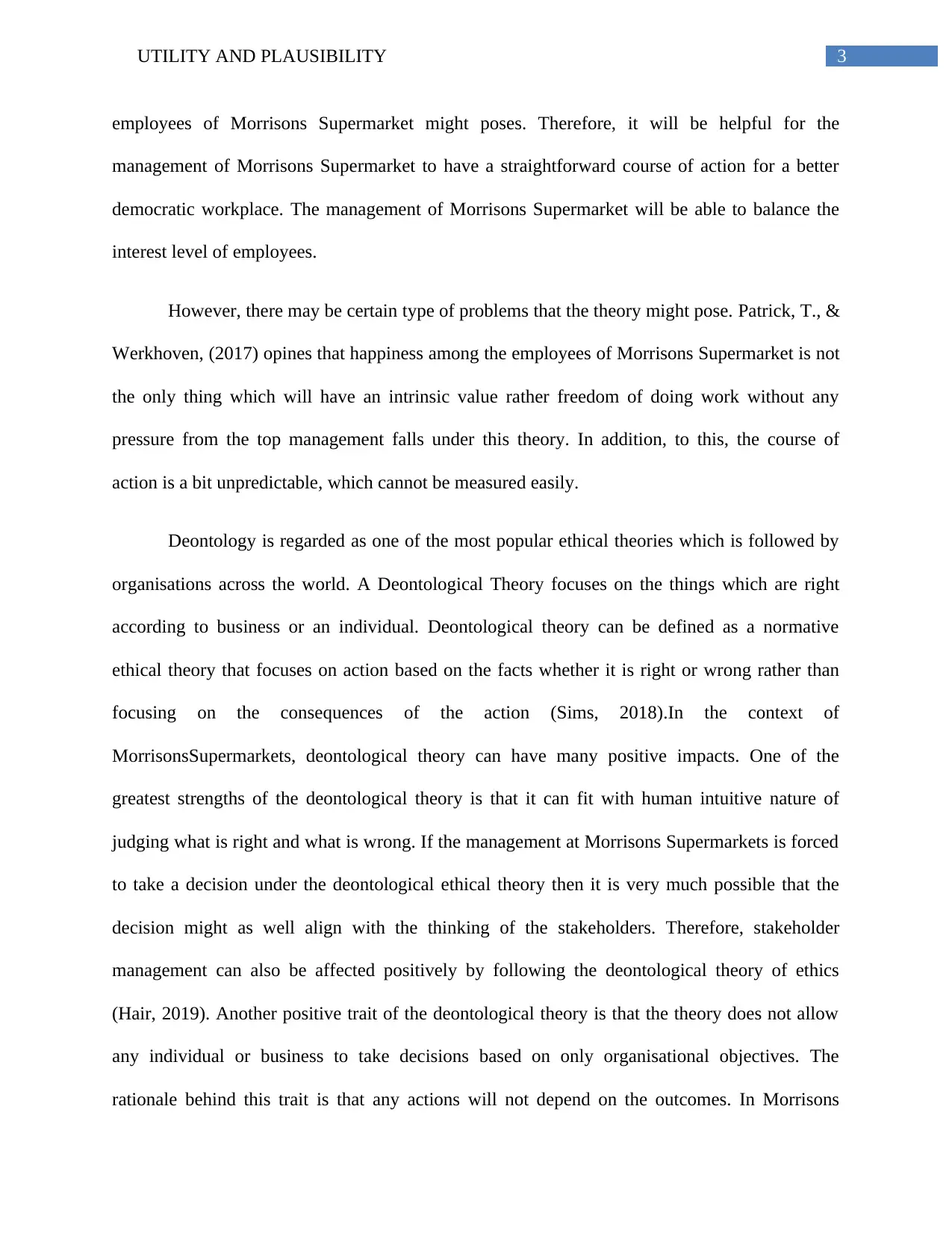
3UTILITY AND PLAUSIBILITY
employees of Morrisons Supermarket might poses. Therefore, it will be helpful for the
management of Morrisons Supermarket to have a straightforward course of action for a better
democratic workplace. The management of Morrisons Supermarket will be able to balance the
interest level of employees.
However, there may be certain type of problems that the theory might pose. Patrick, T., &
Werkhoven, (2017) opines that happiness among the employees of Morrisons Supermarket is not
the only thing which will have an intrinsic value rather freedom of doing work without any
pressure from the top management falls under this theory. In addition, to this, the course of
action is a bit unpredictable, which cannot be measured easily.
Deontology is regarded as one of the most popular ethical theories which is followed by
organisations across the world. A Deontological Theory focuses on the things which are right
according to business or an individual. Deontological theory can be defined as a normative
ethical theory that focuses on action based on the facts whether it is right or wrong rather than
focusing on the consequences of the action (Sims, 2018).In the context of
MorrisonsSupermarkets, deontological theory can have many positive impacts. One of the
greatest strengths of the deontological theory is that it can fit with human intuitive nature of
judging what is right and what is wrong. If the management at Morrisons Supermarkets is forced
to take a decision under the deontological ethical theory then it is very much possible that the
decision might as well align with the thinking of the stakeholders. Therefore, stakeholder
management can also be affected positively by following the deontological theory of ethics
(Hair, 2019). Another positive trait of the deontological theory is that the theory does not allow
any individual or business to take decisions based on only organisational objectives. The
rationale behind this trait is that any actions will not depend on the outcomes. In Morrisons
employees of Morrisons Supermarket might poses. Therefore, it will be helpful for the
management of Morrisons Supermarket to have a straightforward course of action for a better
democratic workplace. The management of Morrisons Supermarket will be able to balance the
interest level of employees.
However, there may be certain type of problems that the theory might pose. Patrick, T., &
Werkhoven, (2017) opines that happiness among the employees of Morrisons Supermarket is not
the only thing which will have an intrinsic value rather freedom of doing work without any
pressure from the top management falls under this theory. In addition, to this, the course of
action is a bit unpredictable, which cannot be measured easily.
Deontology is regarded as one of the most popular ethical theories which is followed by
organisations across the world. A Deontological Theory focuses on the things which are right
according to business or an individual. Deontological theory can be defined as a normative
ethical theory that focuses on action based on the facts whether it is right or wrong rather than
focusing on the consequences of the action (Sims, 2018).In the context of
MorrisonsSupermarkets, deontological theory can have many positive impacts. One of the
greatest strengths of the deontological theory is that it can fit with human intuitive nature of
judging what is right and what is wrong. If the management at Morrisons Supermarkets is forced
to take a decision under the deontological ethical theory then it is very much possible that the
decision might as well align with the thinking of the stakeholders. Therefore, stakeholder
management can also be affected positively by following the deontological theory of ethics
(Hair, 2019). Another positive trait of the deontological theory is that the theory does not allow
any individual or business to take decisions based on only organisational objectives. The
rationale behind this trait is that any actions will not depend on the outcomes. In Morrisons
⊘ This is a preview!⊘
Do you want full access?
Subscribe today to unlock all pages.

Trusted by 1+ million students worldwide
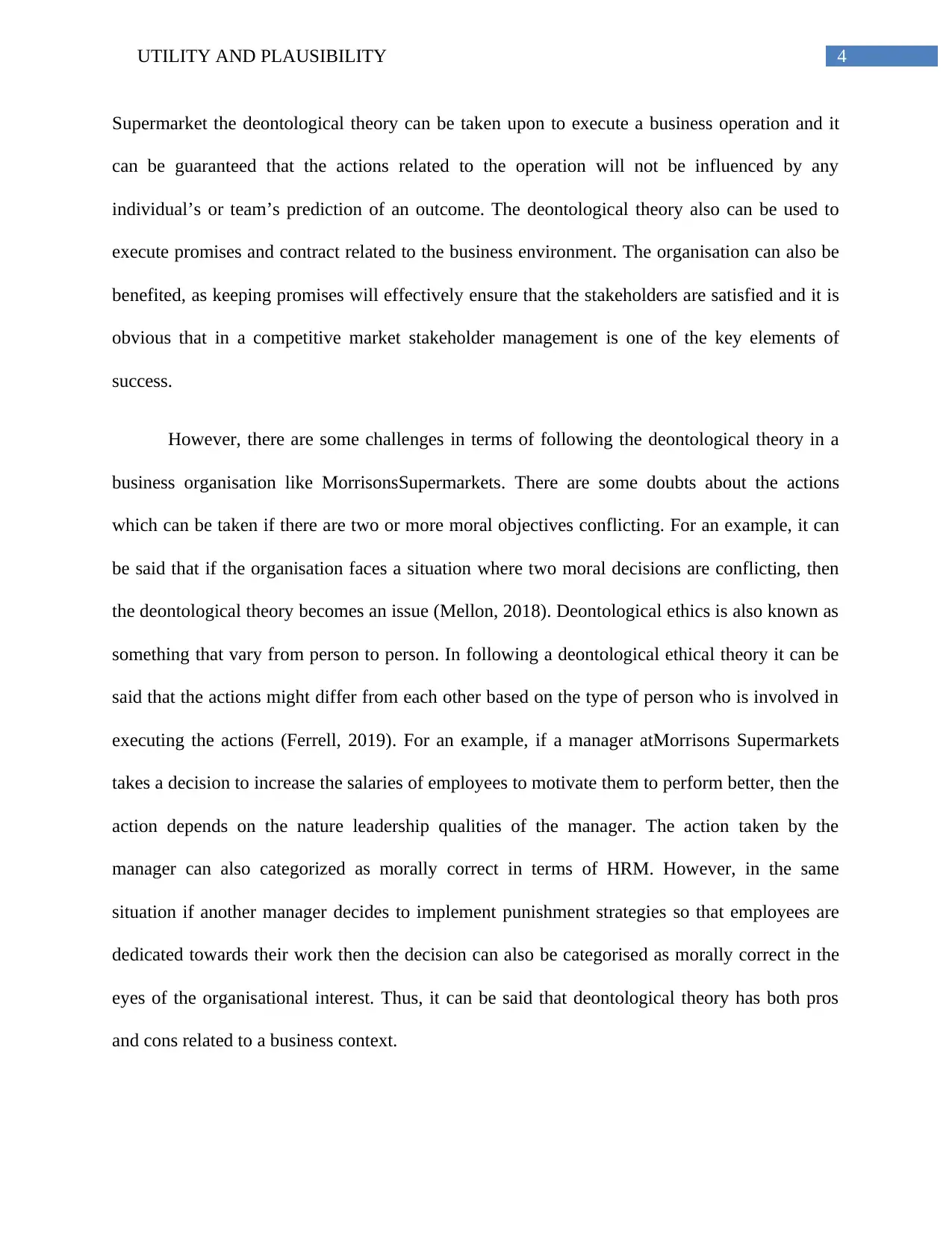
4UTILITY AND PLAUSIBILITY
Supermarket the deontological theory can be taken upon to execute a business operation and it
can be guaranteed that the actions related to the operation will not be influenced by any
individual’s or team’s prediction of an outcome. The deontological theory also can be used to
execute promises and contract related to the business environment. The organisation can also be
benefited, as keeping promises will effectively ensure that the stakeholders are satisfied and it is
obvious that in a competitive market stakeholder management is one of the key elements of
success.
However, there are some challenges in terms of following the deontological theory in a
business organisation like MorrisonsSupermarkets. There are some doubts about the actions
which can be taken if there are two or more moral objectives conflicting. For an example, it can
be said that if the organisation faces a situation where two moral decisions are conflicting, then
the deontological theory becomes an issue (Mellon, 2018). Deontological ethics is also known as
something that vary from person to person. In following a deontological ethical theory it can be
said that the actions might differ from each other based on the type of person who is involved in
executing the actions (Ferrell, 2019). For an example, if a manager atMorrisons Supermarkets
takes a decision to increase the salaries of employees to motivate them to perform better, then the
action depends on the nature leadership qualities of the manager. The action taken by the
manager can also categorized as morally correct in terms of HRM. However, in the same
situation if another manager decides to implement punishment strategies so that employees are
dedicated towards their work then the decision can also be categorised as morally correct in the
eyes of the organisational interest. Thus, it can be said that deontological theory has both pros
and cons related to a business context.
Supermarket the deontological theory can be taken upon to execute a business operation and it
can be guaranteed that the actions related to the operation will not be influenced by any
individual’s or team’s prediction of an outcome. The deontological theory also can be used to
execute promises and contract related to the business environment. The organisation can also be
benefited, as keeping promises will effectively ensure that the stakeholders are satisfied and it is
obvious that in a competitive market stakeholder management is one of the key elements of
success.
However, there are some challenges in terms of following the deontological theory in a
business organisation like MorrisonsSupermarkets. There are some doubts about the actions
which can be taken if there are two or more moral objectives conflicting. For an example, it can
be said that if the organisation faces a situation where two moral decisions are conflicting, then
the deontological theory becomes an issue (Mellon, 2018). Deontological ethics is also known as
something that vary from person to person. In following a deontological ethical theory it can be
said that the actions might differ from each other based on the type of person who is involved in
executing the actions (Ferrell, 2019). For an example, if a manager atMorrisons Supermarkets
takes a decision to increase the salaries of employees to motivate them to perform better, then the
action depends on the nature leadership qualities of the manager. The action taken by the
manager can also categorized as morally correct in terms of HRM. However, in the same
situation if another manager decides to implement punishment strategies so that employees are
dedicated towards their work then the decision can also be categorised as morally correct in the
eyes of the organisational interest. Thus, it can be said that deontological theory has both pros
and cons related to a business context.
Paraphrase This Document
Need a fresh take? Get an instant paraphrase of this document with our AI Paraphraser
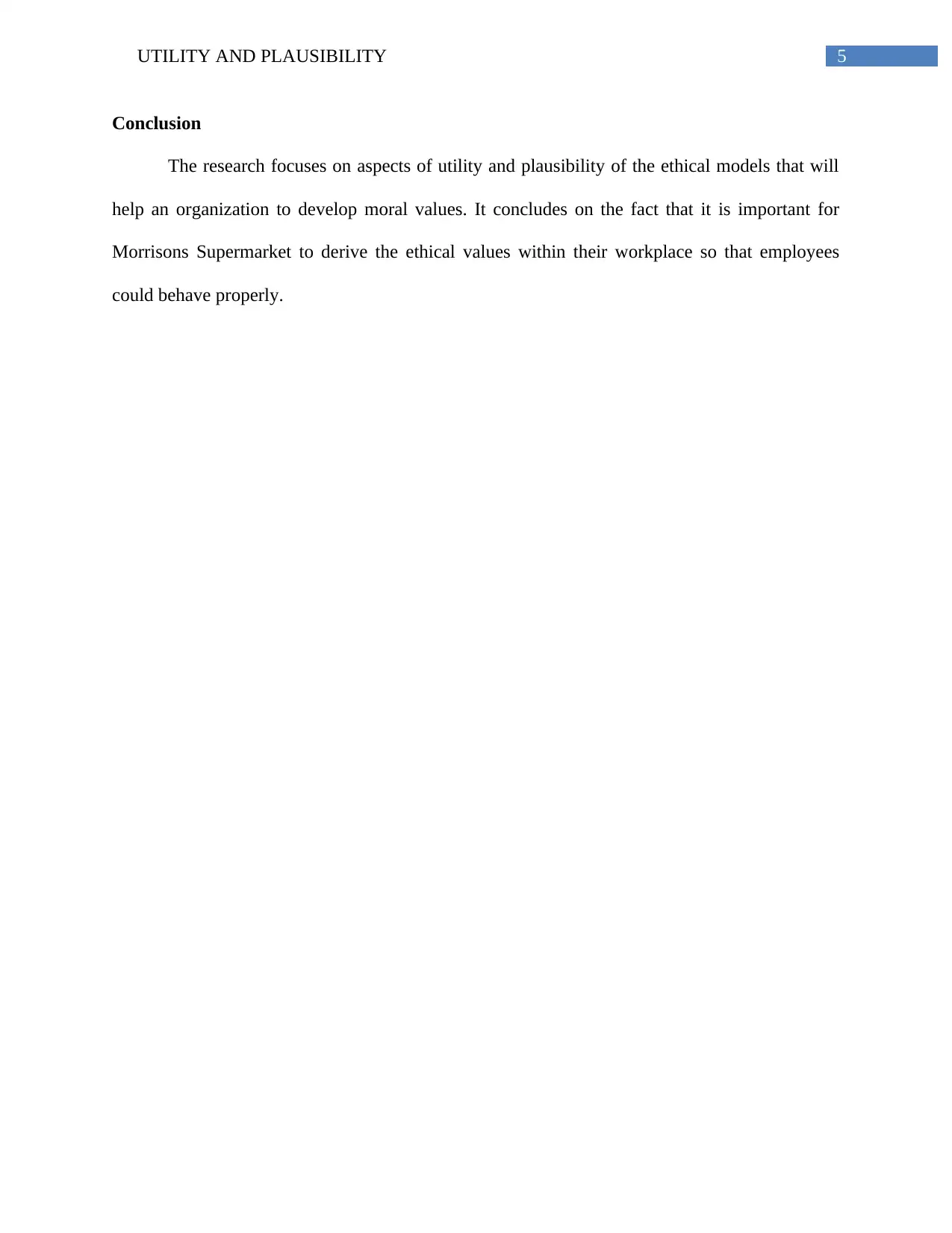
5UTILITY AND PLAUSIBILITY
Conclusion
The research focuses on aspects of utility and plausibility of the ethical models that will
help an organization to develop moral values. It concludes on the fact that it is important for
Morrisons Supermarket to derive the ethical values within their workplace so that employees
could behave properly.
Conclusion
The research focuses on aspects of utility and plausibility of the ethical models that will
help an organization to develop moral values. It concludes on the fact that it is important for
Morrisons Supermarket to derive the ethical values within their workplace so that employees
could behave properly.
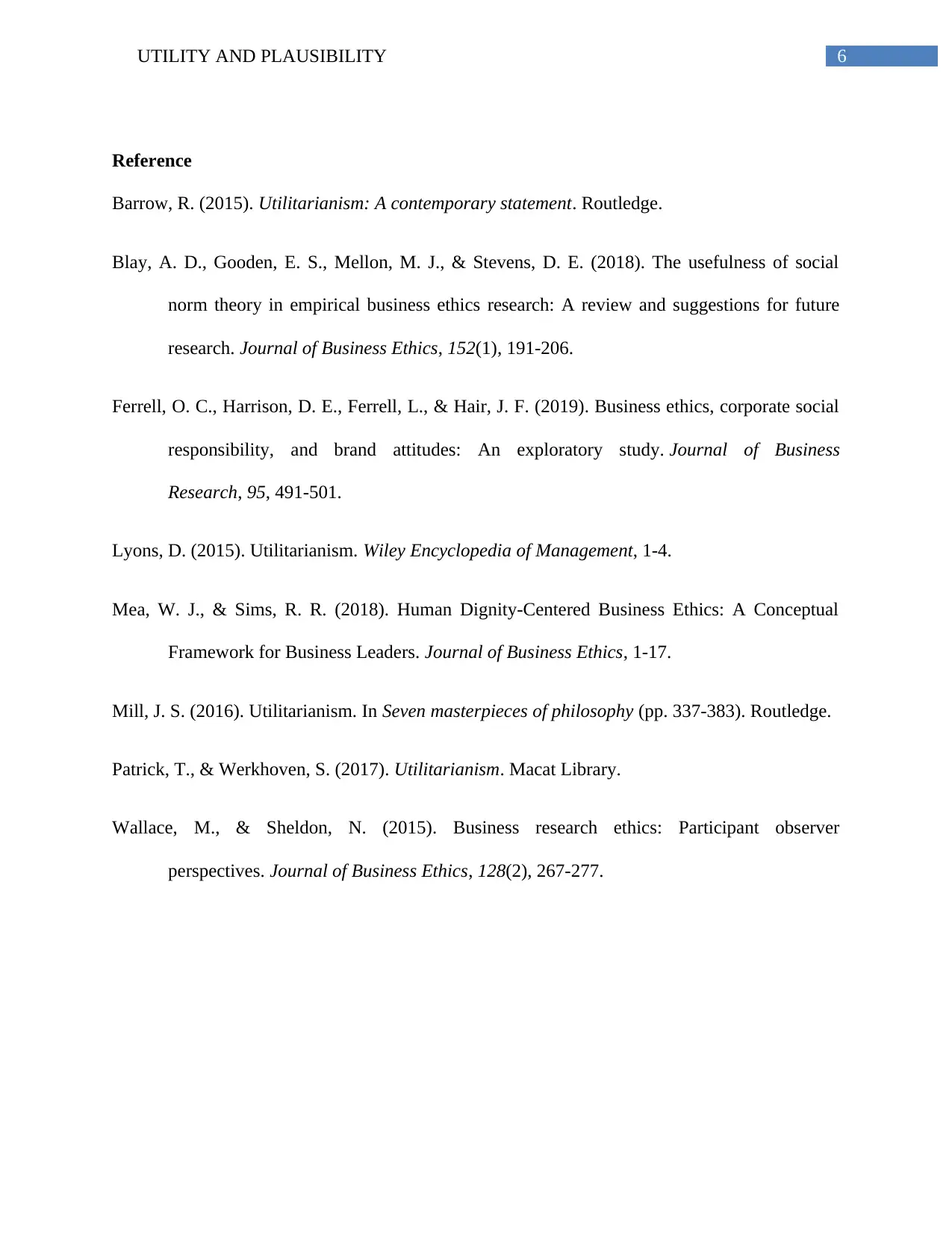
6UTILITY AND PLAUSIBILITY
Reference
Barrow, R. (2015). Utilitarianism: A contemporary statement. Routledge.
Blay, A. D., Gooden, E. S., Mellon, M. J., & Stevens, D. E. (2018). The usefulness of social
norm theory in empirical business ethics research: A review and suggestions for future
research. Journal of Business Ethics, 152(1), 191-206.
Ferrell, O. C., Harrison, D. E., Ferrell, L., & Hair, J. F. (2019). Business ethics, corporate social
responsibility, and brand attitudes: An exploratory study. Journal of Business
Research, 95, 491-501.
Lyons, D. (2015). Utilitarianism. Wiley Encyclopedia of Management, 1-4.
Mea, W. J., & Sims, R. R. (2018). Human Dignity-Centered Business Ethics: A Conceptual
Framework for Business Leaders. Journal of Business Ethics, 1-17.
Mill, J. S. (2016). Utilitarianism. In Seven masterpieces of philosophy (pp. 337-383). Routledge.
Patrick, T., & Werkhoven, S. (2017). Utilitarianism. Macat Library.
Wallace, M., & Sheldon, N. (2015). Business research ethics: Participant observer
perspectives. Journal of Business Ethics, 128(2), 267-277.
Reference
Barrow, R. (2015). Utilitarianism: A contemporary statement. Routledge.
Blay, A. D., Gooden, E. S., Mellon, M. J., & Stevens, D. E. (2018). The usefulness of social
norm theory in empirical business ethics research: A review and suggestions for future
research. Journal of Business Ethics, 152(1), 191-206.
Ferrell, O. C., Harrison, D. E., Ferrell, L., & Hair, J. F. (2019). Business ethics, corporate social
responsibility, and brand attitudes: An exploratory study. Journal of Business
Research, 95, 491-501.
Lyons, D. (2015). Utilitarianism. Wiley Encyclopedia of Management, 1-4.
Mea, W. J., & Sims, R. R. (2018). Human Dignity-Centered Business Ethics: A Conceptual
Framework for Business Leaders. Journal of Business Ethics, 1-17.
Mill, J. S. (2016). Utilitarianism. In Seven masterpieces of philosophy (pp. 337-383). Routledge.
Patrick, T., & Werkhoven, S. (2017). Utilitarianism. Macat Library.
Wallace, M., & Sheldon, N. (2015). Business research ethics: Participant observer
perspectives. Journal of Business Ethics, 128(2), 267-277.
⊘ This is a preview!⊘
Do you want full access?
Subscribe today to unlock all pages.

Trusted by 1+ million students worldwide
1 out of 6
Related Documents
Your All-in-One AI-Powered Toolkit for Academic Success.
+13062052269
info@desklib.com
Available 24*7 on WhatsApp / Email
![[object Object]](/_next/static/media/star-bottom.7253800d.svg)
Unlock your academic potential
Copyright © 2020–2026 A2Z Services. All Rights Reserved. Developed and managed by ZUCOL.





